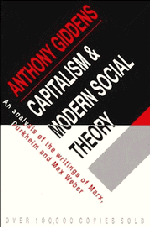Book contents
- Frontmatter
- Contents
- Acknowledgements
- Preface
- Introduction
- List of abbreviations used
- Dedication
- Part 1 Marx
- Part 2 Durkheim
- Part 3 Max Weber
- Part 4 Capitalism, socialism and social theory
- 13 Marx's influence
- 14 Religion, ideology and society
- 15 Social differentiation and the division of labour
- Postscript: Marx and modern sociology
- Bibliography of works cited in text
- Index
13 - Marx's influence
Published online by Cambridge University Press: 05 August 2013
- Frontmatter
- Contents
- Acknowledgements
- Preface
- Introduction
- List of abbreviations used
- Dedication
- Part 1 Marx
- Part 2 Durkheim
- Part 3 Max Weber
- Part 4 Capitalism, socialism and social theory
- 13 Marx's influence
- 14 Religion, ideology and society
- 15 Social differentiation and the division of labour
- Postscript: Marx and modern sociology
- Bibliography of works cited in text
- Index
Summary
The intellectual relationship between the writings of Marx on the one hand, and those of Durkheim and Weber on the other, cannot be analysed satisfactorily without reference to the social and political changes which both conjoined and disconnected the works of the three writers. Durkheim and Weber were each critics of Marx, and consciously directed part of their work to the refutation or qualification of Marx's writings: indeed, the remark that the bulk of Weber's intellectual output represents a prolonged ‘dialogue with the ghost of Marx’, has often been reiterated in the secondary literature. But in both France and Germany, in the late nineteenth century, the influence of Marx's thought was far more than purely intellectual in character: in the shape of ‘Marxism’, Marx's writings became the primary impetus within a vital and dynamic political movement. As such, Marxism, and ‘revolutionary socialism’ more generally, formed a major element in the horizon of Durkheim and Weber, especially so in the case of the latter.
Marx conceived his works to furnish a platform for the accomplishment of a definite Praxis, and not simply as academic studies of society. The same is true, although not of course in an exactly comparable manner, of both Durkheim and Weber; each directed his writings towards the prophylaxis of what they considered to be the most urgent social and political problems confronting contemporary man, and attempted to provide an alternative standpoint to that set out by Marx.
- Type
- Chapter
- Information
- Capitalism and Modern Social TheoryAn Analysis of the Writings of Marx, Durkheim and Max Weber, pp. 185 - 204Publisher: Cambridge University PressPrint publication year: 1971
- 2
- Cited by



